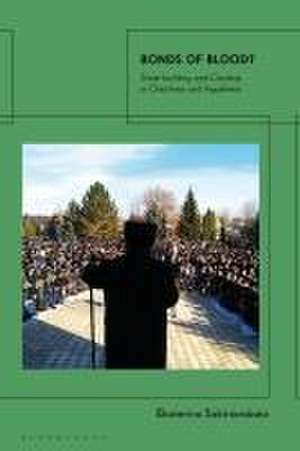Bonds of Blood?: State-building and Clanship in Chechnya and Ingushetia
Autor Ekaterina Sokirianskaiaen Limba Engleză Paperback – 18 sep 2024
| Toate formatele și edițiile | Preț | Express |
|---|---|---|
| Paperback (1) | 192.48 lei 3-5 săpt. | |
| Bloomsbury Publishing – 18 sep 2024 | 192.48 lei 3-5 săpt. | |
| Hardback (1) | 511.57 lei 6-8 săpt. | |
| Bloomsbury Publishing – 8 mar 2023 | 511.57 lei 6-8 săpt. |
Preț: 192.48 lei
Preț vechi: 249.97 lei
-23% Nou
Puncte Express: 289
Preț estimativ în valută:
36.83€ • 40.17$ • 31.06£
36.83€ • 40.17$ • 31.06£
Carte disponibilă
Livrare economică 03-17 aprilie
Preluare comenzi: 021 569.72.76
Specificații
ISBN-13: 9781350271739
ISBN-10: 135027173X
Pagini: 280
Dimensiuni: 156 x 234 x 25 mm
Greutate: 0.4 kg
Editura: Bloomsbury Publishing
Colecția Bloomsbury Academic
Locul publicării:London, United Kingdom
ISBN-10: 135027173X
Pagini: 280
Dimensiuni: 156 x 234 x 25 mm
Greutate: 0.4 kg
Editura: Bloomsbury Publishing
Colecția Bloomsbury Academic
Locul publicării:London, United Kingdom
Caracteristici
Takes the unique view - in comparison to dominant academic discussions regarding clan politics in Chechnya - that the current subnational authoritarianism which characterizes the region is not the result of the pre-existing social composition of the society, namely clans, but a reflection of the political institutions imposed by Moscow
Notă biografică
Ekaterina Sokirianskaia is Director of the Conflict Analysis and Prevention Centre at the Norwegian Institute of International Affairs, Norway.
Cuprins
Chapter 1: Introduction Chapter 2: Theoretical Approaches to State and Society Chapter 3: Political Order and Social Integration: Before Colonization and in the Russian Empire Chapter 4: State-Building and Social Integration in the Soviet State (1921-1991) Chapter 5: Social Integration Today Chapter 6: The Nationalist State-Building Project in Chechnya (1991-1994) Chapter 7: The Islamist State-Building Project in Chechnya, 1997-1999Chapter 8: The Democratic State-Building Project in IngushetiaChapter 9: Moscow-installed Authoritarian Regimes: 2002-2019 Chapter 10: ConclusionIndex
Recenzii
This book is a truly exceptional analysis of the sociopolitical structures and of the political developments of the North Caucasus. The author discusses with great erudition the rivalry of customary, Islamic, nationalist and Russian patterns of social integration, the transformation and disintegration of clans and the development of novel forms of power structures and ideologies. Bonds of Blood? is a landmark in post-colonial studies.
This research is a deep reexamination of the roles clans play in Chechen and Ingush societies. Based on in-depth and long-lasting field work carried out under difficult conditions, Ekaterina Sokirianskaya provides us with a new analysis of a sensitive topic.In this brilliant book, she manages to show how traditional ties of belonging have adapted to the circumstances of a large scale war. This book, which gives amazing insight into colonized societies and their agency, is invaluable to all who wish to understand the functioning of Chechen and Ingush societies. Ekatarina Sokirianskaya's work rejects and dismantles the stereotypes and clichés which plague these societies.
This research is a deep reexamination of the roles clans play in Chechen and Ingush societies. Based on in-depth and long-lasting field work carried out under difficult conditions, Ekaterina Sokirianskaya provides us with a new analysis of a sensitive topic.In this brilliant book, she manages to show how traditional ties of belonging have adapted to the circumstances of a large scale war. This book, which gives amazing insight into colonized societies and their agency, is invaluable to all who wish to understand the functioning of Chechen and Ingush societies. Ekatarina Sokirianskaya's work rejects and dismantles the stereotypes and clichés which plague these societies.
